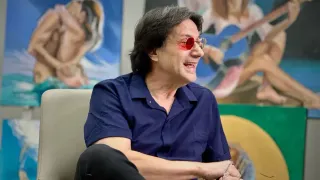August 22, 2016
'Star Trek: Discovery' :: Where No Gay Has Gone Before?
Kilian Melloy READ TIME: 11 MIN.
Earlier this month Bryan Fuller, the creator of the new "Star Trek" series -- reportedly titled "Star Trek: Discovery" -- revealed that the show will boast an openly gay character.
Could it be true? After half a century, could an iconic drama conceived as a way to address social issues through the guise of science fiction finally be venturing into that realm of hot-button culture clashes, the pink galaxy of the GLBTs?
Months from its premiere - the series hasn't even begin production yet, in fact - the new show already has a lot going for it. Nicholas Meyer has joined the staff; he's the man who gave the script of "Star Trek II: The Wrath of Khan" an uncredited page-one re-write and then directed the movie, creating a classic in the process. He also had input into successive films, and returned to the director's chair for 1991's original cast swan song, "Star Trek VI: The Undiscovered Country."
Fuller has said that the new series will not only feature a gay character, but also adopt a more "novelistic" approach to storytelling, rather than simply delivering a self-contained episode every week for its 13-episode first season. Moreover, the show's main protagonist - the one whose viewpoint the series most often adopts - will be a woman, and - most daringly - she won't be the ship's captain. (It's unclear whether this means she'll be a subordinate officer, a "lower decks" crewmember, or even a civilian.) This offers even more creative possibility for a franchise that seemed for many years to be growing ever more stale and locked into its own rigidly bounded, if not contracting, narrative universe.
The one reservation I have at this point - and I count myself as a die-hard "Trek" true believer - is the design of Discovery itself. Resembling drawings for a new Enterprise that "Star Wars" designer Ralph McQuarrie came up with for a "Star Trek" movie that was never made, the ship looks like a wedge with a too-small saucer section awkwardly jammed on. "Star Trek" has offered a dazzling variety of frankly ugly starships throughout its many storied incarnations, but the design for Discovery has to be the worst ever.
Still, for a quality show, I could get over that objection, much as I got used to the clunky lines of the 24th century Enterprise over seven seasons of "The Next Generation." And even if the new show (which will be following the increasingly commonplace shorter season model) doesn't last for seven years, it could still be a radically bright and stimulating departure for the franchise. Bryan Fuller's track record for keeping shows on the air for more than a couple of seasons might not be the best, but there is no disputing his courage and his innovation as a television writer and producer.
Fuller also knows the material, having been a writer for earlier "Star Trek" series, most notably "Voyager." "Trek" fans might recall that when Jeri Ryan joined "Voyager" in its fourth season -- the same season that saw Fuller join "Voyager"'s writing staff -- the show was the subject of excited rumors that Ryan's character, Seven of Nine, would be written as a lesbian. Given that Seven of Nine was a human who had been assimilated by the Borg, and whose arc over the next several seasons was all about reclaiming her humanity, it could have worked: Tasteful, sensitive, and moving episodes about a woman rediscovering her humanity - and, as part of that, discovering her sexuality for the first time, in a manner not unlike the way many GLTBs finally work out who they are - could have brought "Trek" into the realm of dramatic maturity that would have been seriously cutting edge for the show's era, in the 1990s.
Instead, "Voyager" clung to one of "Star Trek"'s most aggravating weaknesses: A tendency toward juvenile, heterocentric, and paternalistic depictions of sexuality, gender, romance, and relationships. Even the casting of Kate Mulgrew as Kathryn Janeway, the first (and, so far, only) female captain to star in a "Trek" series, was controversial. Fans complained about Mulgrew's Hepburn-like voice; reportedly, network suits fretted over her hair and makeup. Janeway, it would seem, faced what all powerful women face, right up to and including presidential candidate Hillary Clinton: A perception of strong, confident women as "abrasive," whereas men with the same qualities are admired as leaders.
After "Voyager" failed to deliver, GLBT "Trek" fans hoped for good news from the next "Star Trek" series, "Enterprise." For while, it seemed their faith might be rewarded. When "Enterprise" was in development, similar rumors began to circulate that the show, which premiered in 2001, would have an openly gay character. (Personally, I always thought that the security chief on that show, Malcolm Reed, played by Dominic Keating, would have been a good pick for "Trek"'s First Gay Character, given his fascination with -- and eventually bromance with -- the ship's charming Southerner, Chief Engineer Trip Tucker, played by Connor Trineer.)
Alas, it was not to be. "Enterprise," unlike other modern "Star Trek" TV projects - "The Next Generation," "Deep Space Nine," and "Voyager" - was a prequel to the original series. Some fans thought they detected a corresponding retrograde sexism in the show, which - once again - offered a snickering, adolescent view of sexuality. (In the first episode of "Enterprise," two male officers talk in awed tones about exotic three-breasted alien women; by the middle of Season Three, in what can only be regarded as some sort of teen boy fantasy fulfillment, the ship's fully-Vulcan female first officer had seduced Engineer Tucker. Evidently, the guy possessed a universal sex appeal.)
In recent years, Fuller has produced visionary -- but low-rated and sometimes controversial -- fare such as "Dead Like Me," "Pushing Daisies," and "Hannibal," the latter a series that strongly hinted at a sexual undercurrent between its two male core characters, Dr. Hannibal Lecter (Mads Mikkelsen) and Will Graham (Hugh Dancy).
Now with the openly gay Fuller at the helm of the new "Trek" series, it seems that the ardent wish of "Star Trek" fans across the cosmos will be granted. It's taken long enough: The original series, starring William Shatner and Leonard Nimoy as, respectively, Captain Kirk and Mr. Spock debuted on NBC fifty years ago next month. In its day, the original series was a marvel of diversity, with an African American woman, an Asian man, and a half-alien first officer sharing the bridge -- not to mention a gruff Scotsman and, starting in Season Two, a more than slightly Beatles-esque Russian, who was beamed aboard the show to attract youthful viewers.
The original show (which only ran for 79 episodes over three seasons) has been described as a "min-U.N.," symbolizing a future in which humanity has risen above tribalism and united for the greater good. This was the vision of series creator Gene Roddenberry, who defined the show's formula: Set up complex ethical conundrums and allow the characters to find their way toward enlightened, peaceful resolutions rather than simply resorting to force as a first option.
It was a successful formula, winning generations of life-long fans and spawning both a long-running film franchise and an epic succession of sequel series, starting with "The Next Generation" in 1987 and continuing until -- well, until now. "Star Trek" survives cinematically in a re-imagined form with three (reportedly going on four) big-budget movies, starring a whole new cast (the action takes place in an alternate universe, with slightly different versions of the beloved characters), and although there's been a considerable gap on TV between "Enterprise" (which ended in 2005 after a mere four seasons) and the upcoming "Star Trek: Discovery" (slated to premiere in January on CBS, with subsequent episodes to follow online at CBS All Access), the show's legions of fans remain as committed as ever... to the point, mind you, that they even make their own versions of the show, remarkably faithful and well-produced fan series like "Star Trek Continues" and "Star Trek: New Voyages."
Indeed, one of those fan series -- "New Voyages" -- picked up some of the slack left by the official TV shows when it produced a long-neglected script by original series contributor David Gerrold, the openly gay author of the classic episode "The Trouble With Tribbles," who also wrote or co-wrote several other episodes for the original series, as well as its 1973 animated series follow-up, and was even tapped to write for "The Next Generation" for that show's first season.
One of Gerrold's "Next Generation" scripts was an AIDS allegory titled "Blood and Fire," which featured a pair of openly gay crewmen. Sadly, that script was left unproduced, and Gerrold ended up leaving TNG. Decades later, Gerrold had the last laugh, not only seeing his script produced as a two-parter for "Star Trek New Voyages," but also taking the directorial reigns. That episode remains a high point for the fan series. (You can view the two-parter as a movie-length presentation online, at Vimeo.)
I reached out to Gerrold, and he shared his thoughts with me about the upcoming series, calling the inclusion of a gay character "long overdue" and noting, "Trek was supposed to be the leader in diversity, not the cleanup crew.
"There are too many gay fans who have felt 'erased' from the series," Gerrold added; "they want to know they're part of the future too. I'm glad we're finally getting to see it, but I wish it would have been done earlier -- when it could have and should have made an important difference."
Still, Gerrold said, "Bryan Fuller and Nick Meyer are excellent storytellers and I think the show is in good hands, so I'm optimistic."
I'd be remiss if I didn't at least briefly mention the Pocket Books line of original "Star Trek" novels, books that tell all-new stories about all the different ships and crews introduced by the TV shows as well as having created some original "Star Trek" series in print. The first original, novelistic creation was Peter David's "New Frontiers" series, which didn't shy away from intriguing sexual combinations -- made possible, mind you, by the presence of a hermaphroditic crew member. Davis' books also touched upon homosexuality in alien cultures, introducing a gay Vulcan couple at one point.
Other "Star Trek" novelists have followed suit, with Michael A. Martin and Andy Mangels depicting a two gay Enterprise officers in their "TNG" novel "Rogue." (One of them is Lt. Hawk, a secondary character killed in the movie "First Contact." The other is Keru, Hawk's husband.) In his "Deep Space Nine" novel "Harbinger," David Mack depicts a lesbian relationship between a Vulcan and a Klingon, and pissed off at least one homophobic reader. And in his line of "Klingon Empire" novels, Keith R. A. DeCandido referenced a gay couple serving aboard a warship, although he also suggested that their relationship was tacit and would not have been tolerated if widely known. (The Klingons are a militaristic species with rigid codes of conduct.)
Perhaps DeCandido's Klingon-centric take is a clue as to the puzzling omission of gays in the otherwise friendly Federation. Given that America's GLBT military service members had to keep very, very quiet about their true selves for so many years or be cashiered, and given the quasi-military nature of "Star Trek," perhaps the inclusion of gays would simply have been too paradoxical for American audiences until fairly recently. After all, by the time we finally dispensed with "Don't Ask, Don't Tell" and allowed gays to serve openly, "Enterprise" was off the air.
Having watched "Star Trek" for literally my entire life, and having made a study of it as a form of contemporary mythology - imagine Kirk as Odysseus, or Spock as Promethius, and you'll get my gist - I too am optimistic about the new show, but I still have to wonder what took so long, and why "Star Trek," in its various guises, chose to treat same-sex attraction and relationships in such carefully circumspect ways when it addressed the subject at all.
Maybe a 1960s show could only discuss political issues like Vietnam by means of an episode like "A Private Little War," in which a proxy fight between the Federation and the Klingons is carried out by both sides giving primitive firearms to the inhabitants of a preindustrial planet. That being the case, it's not so surprising if a program from that time, with network censors scrutinizing every script, really couldn't have touched upon "the love that dare not speak its name. Slipping anti-war messages past the powers the be is one ting; slipping in a little same-sex sugar, now, that's something else.
But by 1987 and "The Next Generation" TV writers and producers should have been able to talk about gay and lesbian issues without needing to (literally) de-sex us. I'm referring here to a well-intentioned, but horrible misguided, episode in which Commander Riker [Jonathan Frakes] falls in love with a member of a genderless species - an individual who, despite her culture's proscriptions on "distasteful" personal qualities like "masculinity" and "femininity," identifies as female, and risks severe penalties in doing so.
Fast forward to the 1990s, when "Deep Space Nine" and "Voyager" were on the air, and are things any better? Not at all. We could have a "symbiont" like Commander Dax (Terry Farrell), part humanoid but also part co-habiting slug capable of living out a series of lives in either male or female bodies, and happy to jump between genders. That mind-bending conception of alien life was okay, but we evidently couldn't have anything as far out and wild as a gay or lesbian human being. Some homophobic sci-fi fans took this to mean that in the future GLBTs have all been "cured," or somehow genetically scrubbed from humanity's otherwise vibrant array of diversity. That mindset spoke to an all too chilling attitude about what should be done to us gays right here on Earth, right now in the present time.
There were sparks of light in the darkness, such as an offhand remark Dax made in one "Deep Space Nine" episode to an alien she took to be male, a newcomer who confessed to being in love with Deep Space Nine's Ferengi bartender, Quark (Armin Shimerman). "Does he know?" Dax asked. "Know?" the alien squawked. "He doesn't even know I'm female!" It was a charming laugh line, reminiscent, one could argue, of Shakespearean comedy (which always seem to rely on cross-dressing and sexual confusion), but it also served as a depressing reminder that even in Gene Rodenberry's generously envisioned future we didn't seem to have a share.
That changed a little this summer, with the advent of the newest "Star Trek" movie. In a nod to George Takei, the rebooted Sulu was depicted as gay - though if you blinked, you would have missed his tender reunion with his husband and daughter after Enterprise put in to port at Starbase Yorktown. It was a thrilling moment for GLBT "Trek" fans, but it was a fleeting moment. If anything, it made the thirst to see ourselves represented in the future - as Mr. Gerrold so aptly put it above - keener than ever.
In order for a gay character on the new show not to seem like a case of too little, too late, here's what I would like to see: A man or woman who owns his or her sexuality; who's looking for commitment, but not afraid of sexual expression; who doesn't have some sort of tragic family or personal history around not being heterosexual. Someone who can fall in love once in a while, like anyone else on board Discovery, and who might even - this being a show seeking to tell "novelistic" stories - develop a lasting, fully dimensional, and overtly sexual relationship with a long-term partner... maybe even, in the fullness of time, a spouse. In other words, I'd like to see a real, live, breathing human being depicted: Not a stereotype, or a sexless token, or a harmless but amusing clown. I'd like to see the world's foremost series about a hopeful, humanistic future treat a gay person like a human being. I'd like to see our bright gay future depicted like the best of what today offers us - only that little bit better.
Oh, and I'd love to see that clunky Ralph McQuarrie-like ship design re-thought. But that's a minor quibble in comparison.






